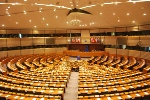Published on Fri, 2016-11-18 09:38
UN Special Rapporteur Sheila Keetharuth presented her report to the Third Committee , calling on the General Assembly to adopt a resolution submitting the Commission’s report to the Security Council for a referral of the Human Rights situation in Eritrea to the International Criminal Court (ICC). The report highlights the Human Rights situation in Eritrea where it states crimes against humanity has been committed by Eritrean officials since 1991. Allegations of enslavement, enforced disappearances, torture and other crimes were on the report. Keetharuth emphasised the need for accountability for these crimes. |
Published on Fri, 2016-11-11 19:43
As the first year of implementation of the 2030 Agenda for Sustainable Development concludes, the technical work at/of the UN continues to refine and agree on the global indicators to measure progress. This involves circulating selected indicators for consultation, adopting a lead agency to collect and submit the data and adopting an agreed methodology, as well as fundraising to increase the extent of data coverage and building capacity. At the same time, as this is a work in progress, many Member States have undertaken national initiatives to review the SDGs and incorporate them into national policy and budget processes. |
Published on Thu, 2016-11-10 21:43
A region overwhelmed by violence and conflicts* Moreover, the realities of women in the Arab region are influenced, directly or indirectly, by the recurrence of conflicts, including state crisis, wars, occupation, and the onslaught of religious fundamentalism and militarized religious extremist group. While the implications on rights and broader political, social, and economic realities differ in these circumstances, they all leave women subjected to various forms of violence and exclusions. It is not expected that the region will be free of these cycles of conflict and violence in the short term; thus the manifestation of this violence will inevitably continue shaping the lives of women and men living in the region. |
Published on Thu, 2016-11-10 18:25
Developing countries continue to suffer from profits taken out by foreign investors, lending by developing countries to rich countries and particularly from illicit financial flows (IFFs). In 2014 Eurodad reported that for every USD 100 a developing country makes, USD 10 are lost, flowing out of the country. Last year’s “Mbeki report” estimated that Africa is losing more than USD 50 billion annually in IFFs. |
Published on Tue, 2016-11-01 23:00
A global alliance of civil society organisations (CSOs) and networks on 24 October presented a report assessing the implementation of the 2030 Agenda for Sustainable Development, as well as highlighting some of the structural obstacles and challenges to its achievement. The CSOs that came together under the Reflection Group on the 2030 Agenda for Sustainable Development comprised the Arab NGO Network for Development (ANND), Development Alternatives with Women for a New Era (DAWN), Social Watch, Third World Network (TWN), and Global Policy Forum (GPF). They were supported by the Friedrich-Ebert-Stiftung (FES). |
SUSCRIBE TO OUR NEWSLETTER







